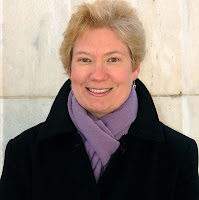The Rodney Dangerfield of Literature
 Elizabeth Foxwell despises Moby-Dick; serves as managing editor of Clues: A Journal of Detection, the only US scholarly periodical on mystery and detective fiction; and won the Agatha Award for her short story “No Man’s Land.” She blogs regularly on mysteries and other literary matters at http://elizabethfoxwell.blogspot.com/
Elizabeth Foxwell despises Moby-Dick; serves as managing editor of Clues: A Journal of Detection, the only US scholarly periodical on mystery and detective fiction; and won the Agatha Award for her short story “No Man’s Land.” She blogs regularly on mysteries and other literary matters at http://elizabethfoxwell.blogspot.com/
The phrase most likely to irritate me?
“Transcends the genre.”
The assumption is ubiquitous: mysteries are just something writers do until they see the light and produce a “real” book. I suppose the corollary is: mysteries are something readers read until Moby-Dick whacks them in the head, they repent the error of their ways, and read only The Mill on the Floss forever after.
Snort. The favorite writer of Nobel Peace Prize recipient Aung San Suu Kui is not some painfully serious author-with-message, but Georges Simenon, the creator of Inspector Maigret.
There are times too numerous to mention where I’ve read a review in Publishers Weekly and thought, “Sounds like a mystery,” but the book, because of some perception of the author in the pecking order rather than a desire for accurate description, appears in the tonier “fiction” category. Yet PW noted in its December 31, 2007, issue, reporting on Bowker data, that mystery/detective was the most popular category for book buyers from January to September 2007.
I detect a dichotomy. Unwilling to be deemed mystery, but more than happy for people to buy it as such?
I’ve referred to mysteries as “the Rodney Dangerfield of literature”—that is, they get no respect, especially from some segments of academe—and find this state of affairs, appropriately enough, mystifying. Writing mysteries is no work for a dilettante. There are background settings to be researched, characters to be developed, crimes to be plotted, clues to be planted, investigations to be conducted, and plausible solutions to be devised—all without, according to the rules of Monsignor Ronald Knox, resorting to Chinamen.
Consider Arthur Conan Doyle, who thought he would be remembered for his historical novels, rather than for what he deemed to be slight stories featuring a character based on his former professor. Today, the universal sign for detective, across cultures, is a tall, thin figure in deerstalker and Inverness cape—a certain sign of immortality. Who reads Micah Clarke these days?
So the next time condescension over the mystery’s place in literature rears its pompous head, produce the following short list:
Nicholas Blake – creator of sleuth Nigel Strangeways (modeled on mystery lover and poet W. H. Auden), better known as British poet laureate Cecil Day Lewis
Madeleine Brent – wrote romantic suspense works; better known as Peter O’Donnell, the creator of Modesty Blaise
G. K. Chesterton – creator of sleuth Father Brown, eminent British man of letters, and Catholic theologian, who once wrote that detective stories are “the earliest and only form of popular literature in which is expressed some sense of the poetry of modern life” (“A Defence of Detective Stories,” The Defendant 158)
William Faulkner – mystery fan and god of Southern literature; wrote the mysteries A Rose for Emily, Intruder in the Dust, and the collection Knight’s Gambit that features lawyer Gavin Stevens.
Graham Greene – Revered for works such as Brighton Rock and The End of the Affair, but delighted in writing what he called his “entertainments,” such as Stamboul Train and The Third Man.
John P. Marquand – won the Pulitzer Prize for The Late George Apley, served on the Book of the Month Club selection panel, created Mr. Moto.
Mary Roberts Rinehart – one of the earliest US female war correspondents (in World War I), appeared on the bestseller list 11 times between 1909 and 1936, created Miss Pinkerton, made more than $9 million in the 1920s from her play The Bat.
Glen Trevor – wrote Was It Murder? , a mystery set in a boys’ school; better known as James Hilton, author of Lost Horizon, Random Harvest, and Goodbye, Mr. Chips.
Respect indeed.
Elizabeth Foxwell

Great post, Elizabeth! Thanks for joining our team for the day. You’re so right–we mystery writers are the Rodney Dangerfields of literature but we have a dedicated, loyal readership and enjoy each others’ work, too, so to those naysayers I say pshaw. (sp?) Maggie
I applaud your justification of the mystery as literature by referring to “serious” authors who wrote mysteries, but I think that many of the pure mystery writers like Michael Connolly and John Sandford deserve credit as master craftsmen of a genre sui generis. Why all this snobbery? Books are meant to be enjoyed, no one forces anyone to read mysteries (while universities and schools DO force people to read literature) so let’s just go for the buzz and enjoy!
PS I love Rodney Dangerfield!